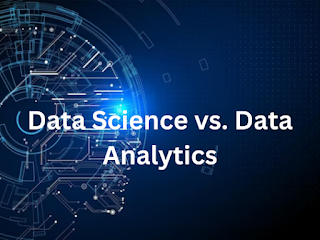Data Science vs. Data Analytics
In the era of data-driven decision-making, both Data Science and Data Analytics play crucial roles in extracting insights and valuable information from vast amounts of data. While these terms are often used interchangeably, they represent distinct disciplines with unique objectives and methodologies. In this article,
Data Science: The Multifaceted Approach
Data Science is a multidisciplinary field that combines expertise in various domains, including mathematics, statistics, computer science, and domain knowledge. It encompasses the entire data lifecycle, from data collection and cleaning to analysis, modeling, and interpretation. Data Scientists are skilled in developing algorithms, building predictive models, and leveraging machine learning techniques to uncover patterns, trends, and correlations within data. They focus on solving complex problems and making data-driven decisions to drive innovation and business growth.
Key Components of Data Science:
Data Collection: Data Scientists are adept at gathering data from various sources, including databases, APIs, and web scraping, ensuring that the data is relevant and of high quality.
Data Cleaning and Preprocessing: Data preprocessing involves cleaning, transforming, and standardizing the data to make it suitable for analysis and modeling.
Exploratory Data Analysis (EDA): EDA involves visualizing and summarizing the data to gain initial insights and identify patterns or anomalies.
Machine Learning: Data Scientists use machine learning algorithms to build predictive models and make accurate predictions on new data.
Statistical Analysis: Statistical techniques are employed to validate findings, assess uncertainty, and make inferences from the data.
Data Analytics: Focused on Insights and Decision-Making
Data Analytics is a subset of Data Science that concentrates on examining data to draw conclusions, inform decision-making, and drive business strategies. It involves the application of statistical techniques, data visualization, and exploratory analysis to generate meaningful insights from data. Data Analysts are proficient in using tools like Excel, SQL, and Tableau to perform data analysis and create reports and dashboards that communicate findings to stakeholders effectively.
Key Components of Data Analytics:
Data Querying and Visualization: Data Analysts use SQL and data visualization tools to query databases and create visualizations that facilitate data exploration.
Descriptive Analytics: Descriptive analytics involves summarizing and interpreting historical data to provide a clear understanding of past performance.
Diagnostic Analytics: Diagnostic analytics seeks to understand the reasons behind certain outcomes or events by examining historical data.
Reporting and Dashboards: Data Analysts create reports and dashboards to present data insights and trends to business stakeholders.
Business Decision-Making: Data Analysts play a crucial role in guiding business decisions based on data-driven insights.
Importance of Data Science and Data Analytics
Both Data Science and Data Analytics are essential for organizations seeking to leverage data for strategic decision-making and competitive advantage. Here's why each is important:
Importance of Data Science:
Advanced Data Modeling: Data Science enables the creation of sophisticated predictive models that can identify complex patterns and trends in data.
Innovating New Products and Services: Data Science allows organizations to innovate and develop new products or services based on data-driven insights and market trends.
Artificial Intelligence and Machine Learning: Data Science drives the implementation of AI and ML applications that can automate processes and improve efficiency.
Big Data Management: Data Science expertise is crucial for handling and processing large-scale datasets, also known as big data.
Importance of Data Analytics:
Business Intelligence: Data Analytics provides business intelligence, enabling organizations to understand their performance and identify areas for improvement.
Decision Support: Data Analytics supports decision-making by providing data-driven insights and evidence to back up choices.
Identifying Market Trends: Data Analytics helps organizations stay ahead of the competition by identifying market trends and consumer preferences.
Operational Efficiency: Data Analytics improves operational efficiency by optimizing processes and identifying bottlenecks.
Conclusion
Both Data Science and Data Analytics are integral components of the data-driven landscape, and their importance depends on the specific needs and objectives of an organization. Data Science covers a wide range of activities, from data collection to advanced modeling and machine learning, making it indispensable for complex problem-solving and innovation. On the other hand, Data Analytics focuses on exploring data to provide insights and support decision-making, driving operational efficiency and business intelligence. While Data Science lays the foundation for cutting-edge technologies and predictive capabilities, Data Analytics ensures that data insights are effectively communicated and translated into actionable strategies. In essence, both Data Science and Data Analytics are equally important in the data-driven journey of organizations, complementing each other to unlock the full potential of data for success and growth.
For more information:
360DigiTMG — Data Science, Data Scientist Course Training in Bangalore
Address: No 23, 2nd Floor, 9th Main Rd, 22nd Cross Rd, 7th Sector, HSR Layout,
Bangalore, Karnataka 560102
Email: enquiry@360digitmg.com
Phone no:1800 212 654321
Map: https://goo.gl/maps/4r8ayo9sjH6vPQYM7
Source link:https://360digitmg.com/blog/ai-in-data-analytics
https://360digitmg.com/blog/what-are-the-best-it-companies-in-bangalore
https://www.facebook.com/360Digitmg/
https://twitter.com/360digitmg
https://www.linkedin.com/company/360-digitmg
https://www.youtube.com/c/360DigiTMG
https://goo.gl/maps/ubYPta4qvp1NU91p6
360DigiTMG Provides:
data course fee in Bangalore


Comments
Post a Comment